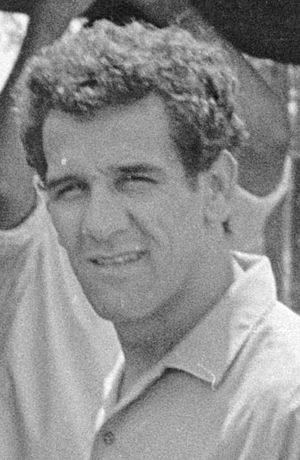Charles Perkins facts for kids
Quick facts for kids
Charles Perkins
|
|
|---|---|

at Moree, February 1965
|
|
| Born | 16 June 1936 |
| Died | 19 October 2000 (aged 64) |
| Cause of death | Renal failure |
| Nationality | Australian |
| Other names | Charlie Perkins, Kumantjayi Perkins |
| Education | Bachelor of Arts |
| Alma mater | University of Sydney |
| Known for | Activism, Public Service, Sport |
| Spouse(s) | Eileen Munchenberg |
| Children | Hetti, Rachel and Adam |
Charles Nelson Perkins (16 June 1936 – 19 October 2000) was a very important Aboriginal leader and activist in Australia. He also played professional football.
Perkins grew up in Alice Springs. His mother was from the Arrernte people and his father was from the Kalkadoon people. He later moved to Sydney. In 1965, he made history by becoming the first Indigenous Australian to graduate from a university, the University of Sydney.
Contents
Fighting for Rights
Charles Perkins worked hard to get land rights for Aboriginal people. He wanted them to have control over their traditional lands.
The Freedom Ride
In 1965, Perkins was a key person in the "Freedom Ride" campaign. This was a bus trip through parts of New South Wales. The goal was to show people how Aboriginal Australians were being treated unfairly. They wanted to highlight poor living conditions, low literacy rates, and bad health care. The group became well-known for showing examples of discrimination, where people were treated differently because they were Aboriginal.
The 1967 Referendum
Perkins also played a big part in the campaign for the 1967 referendum. This important vote changed the Australian Constitution. It meant that Aboriginal people could be counted in the national census. It also allowed the Australian Parliament to make special laws just for Aboriginal people. This was a huge step forward for equality.
Working for the Government
From 1969, Charles Perkins worked for the government as a public servant. He was part of the Ministry of Aboriginal Affairs. In 1981, he became the permanent head of this department. This made him the first Aboriginal person to lead a federal government department. He stayed in this role until 1988.
Perkins was known for speaking his mind. He often criticised the Australian Government's policies on Indigenous affairs. He wanted to make sure Aboriginal voices were heard.
He was also the chairman of the Arrernte Council of Central Australia from 1991 to 2000. In 1993, Perkins joined the Aboriginal and Torres Strait Islander Commission (ATSIC). He was elected deputy chair in 1994, but he left in 1995 to work as a consultant for the Australian Sports Commission.
Recognition and Legacy
Charles Perkins received many awards for his important work.
Awards and Honours
- In 1966, he was named Jaycees Young Man of the Year.
- In 1993, he was named NAIDOC Aboriginal of the Year.
- He was made an Officer of the Order of Australia in 1987. This award was for his great service to Aboriginal welfare.
- In 2000, he was added to the Football Federation Australia Football Hall of Fame. This was for his contributions as a player, coach, and administrator in football.
- He received two honorary doctorates from universities. One was from the University of Western Sydney in 1998. The other was from the University of Sydney just before he passed away.
- The National Trust of Australia named him one of Australia's Living National Treasures.
A journalist named John Farquharson wrote that Perkins was "perhaps not only the most influential Aborigine of modern times, but also must be numbered among the outstanding Australians of the century."
Remembering Charles Perkins
Charles Perkins passed away in October 2000 due to kidney failure. He was given a state funeral, which is a special public ceremony. His body was returned to Alice Springs, his hometown, a week later.
His legacy continues to inspire people.
- In 2001, the University of Sydney created the Dr Charles Perkins AO Memorial Oration and Prize in his honour.
- In 2009, The Charlie Perkins Trust started two scholarships each year. These scholarships help Indigenous Australians study at the University of Oxford in England.
- The Charles Perkins Centre at the University of Sydney was named after him. This building was designed in 2012 and opened in 2014.
- In 2013, Australia Post released a series of postage stamps featuring five important Indigenous rights campaigners. Charles Perkins was one of them, along with Shirley Smith, Neville Bonner, Oodgeroo Noonuccal, and Eddie Mabo.
In the Arts
There are several books written about Charles Perkins' life. Artist Bill Leak also painted a portrait of him.
Films About Charles Perkins
- Freedom Ride (1993) is a part of a documentary series called Blood Brothers. It was made by Rachel Perkins (Charles's daughter) and Ned R. Lander.
- Fire Talker (2009) by Ivan Sen uses old film clips from the 1960s to 2001. It creates a close look at Perkins' life and work.
- Remembering Charlie Perkins (2009) features Gordon Briscoe. He talks about his friend Perkins' fight for equality and freedom in the Dr Charles Perkins Memorial Oration.
 | Madam C. J. Walker |
 | Janet Emerson Bashen |
 | Annie Turnbo Malone |
 | Maggie L. Walker |

